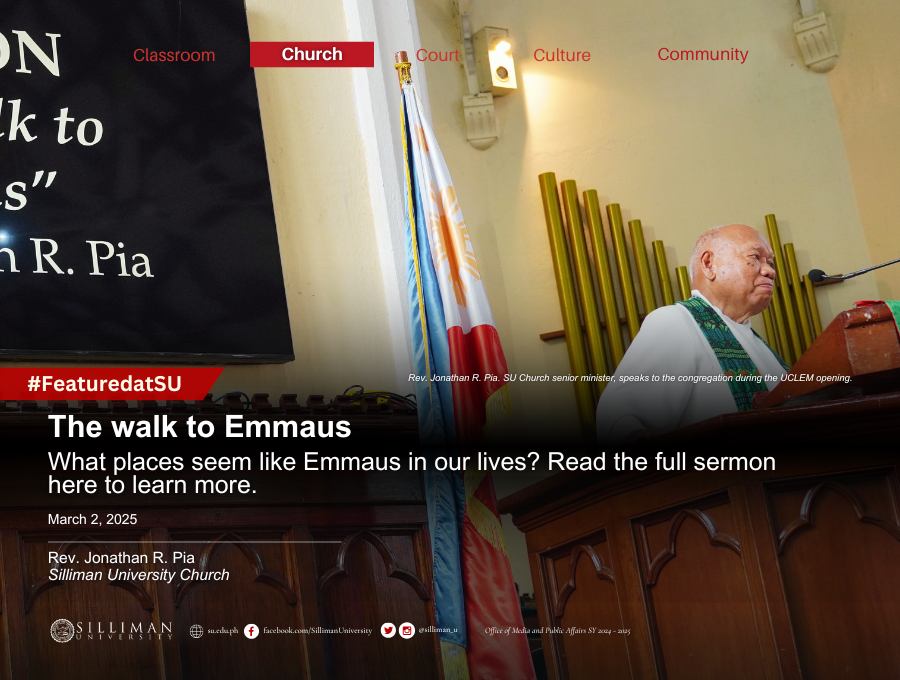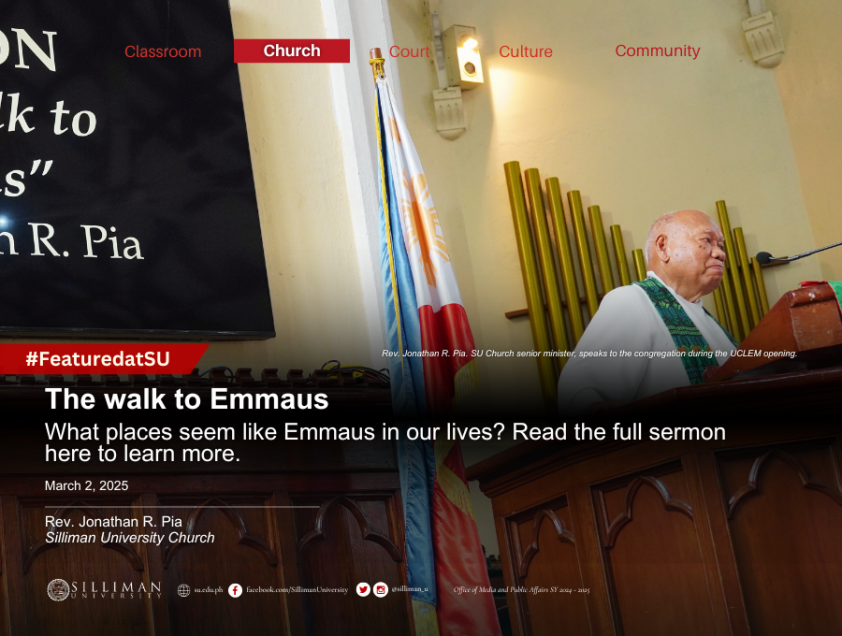
The Walk To Emmaus

Rev. Jonathan R. Pia
Senior Minister
SU Church
The death of Jesus brought an unbelievable nightmare of darkness, engulfing the disciples so suddenly, shattering their spirits and devastating their lives. Cleopas and the other followers of Jesus huddled together that Saturday, scared for their lives, too stunned, uncertain with all their dreams in ruins. Their leader was dead. There were rumors whispered that the tomb was empty. But rumors are rumors. In their depressed state of mind, such stories seem like, according to them, “idle tales.”
Thus, Cleopas and his companion decided to leave town, downcast, defeated, doubtful, wanting to put some space between them and the way they had committed their lives in previous days. And this is the scene as we enter the gospel drama. Dejected and in despair, these two men are leaving Jerusalem, headed west for Emmaus. The hopes of these two disciples lay shattered. They moved in a cloud of perplexity and disillusionment. A week before, the Kingdom of the Messiah was riding the crest of a wave of popularity. Jesus was acclaimed with enthusiasm wherever he went. But now, he was dead; the collapse of the Kingdom that Jesus was talking about was complete. Instead of the long hoped for triumph, there was nothing except this ignominious defeat. Jesus’ death on the cross had crushed all the messianic expectations these disciples had entertained.
And so, these two men groveled along in utter despair. Blinded by grief they did not notice right away the stranger who joined to walk with them. “What was this you have been discussing?” the stranger asked. One of the disciples answered with abruptness, irritation, and exasperation: “Are you the only one of the pilgrims to Jerusalem who did not know what happened? Jesus, the Prophet of Nazareth, was crucified. He was our hope to redeem Israel. And, on top of that, some of the women in our company went to the tomb this morning and came back with the report that the tomb was empty. We think that the whole thing is an “idle tale.” And then the sad rebuke from the stranger: “O foolish men, O, foolish men, and slow of heart to believe.”
These two men on that road to Emmaus on that first Easter became the vanguard of a great company of people groveling along hopelessly on the roads to their Emmauses, perplexed, despairing, disillusioned – because they will not believe what they have heard.
You know, we who are in the university believe that there must be documentation of the facts made by reliable, contemporary witnesses. And then, there must be effects on the other events in history that indicate that the event in question did actually occur.
As we look at this story some things are of special note.
I
First, Emmaus is every person’s town. I’ve been to the Emmaus of the gospel story when I visited the Holy Land. That Emmaus is a village west of Jerusalem on the main road to the seacoast. But I have been to a lot of other Emmauses. For Emmaus can be a place where we want to go to get away and try to forget our frustration, confusion, grief, and despair. It can be a time or place to sort out our feelings and somehow find a way to start again. Emmaus is whatever we do or wherever we go to sort out our feelings, to summon the courage to keep on going or to try and forget. Emmaus is whatever we do and wherever we go to reclaim our sanity when our world goes to pieces, when our ideals and dreams are violated and distorted, when we discover that there is nothing sacred anymore, when love and goodness are rejected and profaned by selfish people. It may happen at the betrayal of one we respect very much. Or as the one we love the most with whom we shared the intimacy of marriage leaves us for another person. The death of our spouse or a parent may take us there. It can come when an illness confines us and there is no respite from pain. Or when illness strikes a child and we are helpless and can do nothing but sit by the side of that bed and hold the child’s hand, as that child hovers between life and death. It may come with an advancing age when we are forced to accept the limitations of decreasing vitality. It comes from our disillusionment about an honest election or upon hearing a lot of corruption in government offices. Or it may come when church leaders are fighting. We may head for Emmaus when our involvement in the struggle to right some wrong winds up in utter defeat, and the cause to which we gave our life is undermined by the greed and deceit of trusted leaders. It may come at a personal moral crisis, when we wake up to the fact of how miserable we have made our own life or the lives of those who love us. And we have to decide whether we want to change, let go of the old and turn to God and start all over again, pick up and build a new life. Yes, at the turning points and traumas of life, we head for some Emmaus, to get away from it all and to wait it out and to seek how to discover how to live with it.
II
Then there is a second truth in this story. In our walk to Emmaus, in the midst of or in the aftermath of defeat and despair, of suffering and pain, of confusion and doubt, there is always the friend who walks with us. Sometimes we won’t notice that friend because of our pain and confusion. Jesus, our friend often comes to us incognito.Mother Theresa says he comes most often through those who are suffering, the poorest of the poor. those disenfranchised with the world. She tells the story of walking past an open drain and catching a glimpse of a dying man, whom she took to her home, where he could die in love and peace. That man that day said, I live like an animal in the streets, now I will die like an angel. How wonderful to see a person die in love, Mother Theresa exclaims.
Or Jesus comes through a husband or a wife, who keeps on loving us when we are selfish and uncaring, callous, even mean. He comes through a person who loves us enough to be honest with us, to help us to face up to ourselves and to see ourselves as we are. He comes through a friend who keeps telling us to live out our Christian commitment.
There is all the poignant, wistful, bewildered regret in the world in the disciples’ sorrowing words, “We were hoping that he was the one who was going to rescue Israel.” They are the words of men whose hopes are dead and buried. And then Jesus came and talked with them and the meaning of life became clear to them and the darkness became light. It is only in Jesus, even in the bewildering times, that we Christians learn what life really means.
III
This takes us to another point captured in verses 28 and 29. So, they drew near to the village, the scripture says, the village to which they were going. “Jesus appeared to be going further, but they constrained him saying – stay with us, for it is toward evening and the day is now far spent.” Jesus waited for an invitation to come in. And here is focused for us, the greatest gift God has given us is the gift of free will. We need to invite Jesus to walk and stay with us.
During this University Christian Life Emphases Month, feel that strange presence and that insistent knocking on the door of your heart. We have to invite Jesus in. And if you invite Jesus into your life, our eyes be opened to Christ’s presence and our hearts will burn with passion.
Thus, on our road to Emmaus, Jesus will come. He may be incognito, but he’ll come, and he’ll help us make sense out of life. And if we invite him our life will never be the same in terms of meaning and purpose and joy.
Now the final thing I want to say, it is in ordinary ways that the Lord is made known to us – in the breaking of a common piece of bread and the sharing of a cup of wine, the resurrected Lord was known to those crushed and despairing men at Emmaus.
And I pray that the Holy Spirit accompanies us in our own journeys, and that somewhere along the way it may be with us as it was with Cleopas and his companion that our eyes will be opened, and we recognize the risen Christ walking with us.


